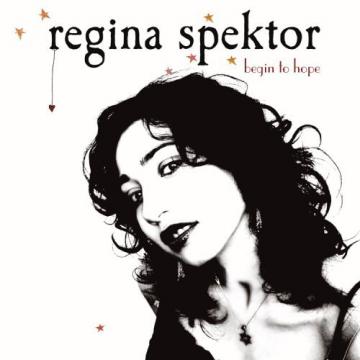One of the best albums of the year

Begin To Hope - 2006
Plucked strings conversate with growly chunks of piano before they slide smoothly together, only to cut out for
wordlessly-light vocalizations and gentle handclaps. Then comes the voice, warm and childishly pure though traced at the
edges with experience. It’s a clear and beautiful voice, but one that has been mastered and grown into, that can turn at will
to emotional cracking or dauntless vibrato. “This is how it works / It feels a little worse / Than when we drove our hearse /
Right through that screaming crowd / While laughing up a storm,” she sings, adding later, “And all the styrofoam / Began to
melt away / We tried to find some worms / To aid in the decay”. It’s a sublimely perfect gem of a pop song, but the lyrics
are entirely unique, a nearly-absurdist parade of logically-unrelated images that somehow build to a perfect mood. It’s
catchy and unexpectedly touching; it reaches inside of you, and carves itself a space.
“On the Radio” is only one of many examples of such songwriting. Regina Spektor is an anomaly within the music world: a
product of the New York café scene who sounds like exactly nobody else in the New York café scene and a star of the anti-folk
movement whose music is only somewhat anti-folk. Over the course of countless live performances, two independent albums, and
a major-label debut, she has earned herself a reputation as one of the most unique, quirky, experimental, and downright
transcendent singer-songwriters working today. She plays piano with the skill of years of classical training, but her
compositions are distinctly different, idiosyncratic and human, and she is a consummate performer. She can build emotion with
a single vocal flourish like no other, and her sometimes startlingly personal musical sketches often travel surprising
distances as they twist and turn. She’s come a way since her recklessly freewheeling early recordings, which featured
everything from stretches of complete atonality to manic bursts of rapping and guttural singing, but rather than trade in her
fierce independence as her profile has grown, she’s instead learned to control it, to twist it into what look at first glance
like beautiful, conventional pop songs but gradually spiral into whole new realms.
While her first albums often featured only piano, vocals, and sometimes jazzy string bass, producer David Kahne takes
Begin to Hope in a new direction. Soviet Kitsch could feel almost frenetically bipolar at times, tracks like the
electric-guitar duet with Kill Kenada not quite meshing with the softer piano ballads, but Begin to Hope adds elements like
guitar and beautifully lilting string arrangements while at the same time making sure they mesh perfectly, making for a more
natural-feeling progression. The album-opening first single “Fidelity” is a perfect example. Spektor is her pitch-perfect
self, but the piano has been replaced by subtly-building synths and gorgeous strings. It’s like a favorite food cooked by a
different talented chef: familiar, slightly changed, freshly wonderful.
And while the album may initially seem less willing to take risks than its predecessors because of songs like the
Stroke-featuring pure pop of “Better” and the sparklingly processed album artwork (contrasted with the borderline-tasteless
kitsch of Soviet), this is a misleading judgement. There’s nothing to be found along the lines of the abrupt tempo changes of
“Chemo Limo”, certainly, but many of the songs play around more with their arrangements, and even her most
seemingly-bubblegum confections are often subverted by their lyrics and delivery. “Hotel Song” is the most brightly
irresistable pop song to never chart, not only for surreal lines like “I have dreams of orca whales and owls, but I wake up
in fear” but for the joyously crowed hook that begins, “A little bag of cocaine, a little bag of cocaine / So who’s the girl
wearing my dress”. “That Time” likewise begins with an energetic guitar loop while Spektor growls her lyrics with arrogant
assurance, spiking it with things like an absurd squeal of “so cheap and juicy!”. Then, once you think you’ve got it figured
out, she pulls back suddenly to a near-whisper. “Hey, remember that time when you OD’ed / Hey, remember that other time when
you OD’ed...for a second time,” she states softly, and it’s a surprising emotional punch.
On “20 Years of Snow”, shimmery-tinkly curtains of musicbox sound fade into beautifully complex glides of piano chords,
and Spektor builds her gorgeous vocals off of this almost arrhythmic base while making it sound completely natural. “Apres
Moi” is another highlight, a thunderously dark storm of piano and grunt-laced singing in multiple languages that crescendoes
brilliantly to an ominous chorus. It’s telling that the lowest point of the disc is probably “Samson”, but only because the
track appeared in an earlier form on her harder-to-find independent release Songs. There it was a gorgeously spare,
emotionally wrenching piano ballad, just Regina and beautiful chords and her inscrutable but oddly touching lyrics. Here it’s
been sped up, her voice is less vulnerable, and other instruments are added; either version is beautiful, and each fits its
particular album better than the other, but the starker original version is somehow more touching. For newcomers to Spektor’s
work, though, this version is still oddly haunting, retelling the familiar biblical story from the perspective of a loving,
subtly regretful Delilah. “I cut his hair myself one night / A pair of dull scissors and the yellow light / And he told me
that I’d done alright,” she sings, balancing poignantly the mythical and the mundane, referencing alternately the Bible’s
crashing columns and Wonder Bread.
With a new album of expertly-crafted, touching, and refreshingly honest odes to life, Regina Spektor has grown without
growing away from what makes her so special. Irreverent and innocent, theatrical and tender, cataclysmic and cute: human.